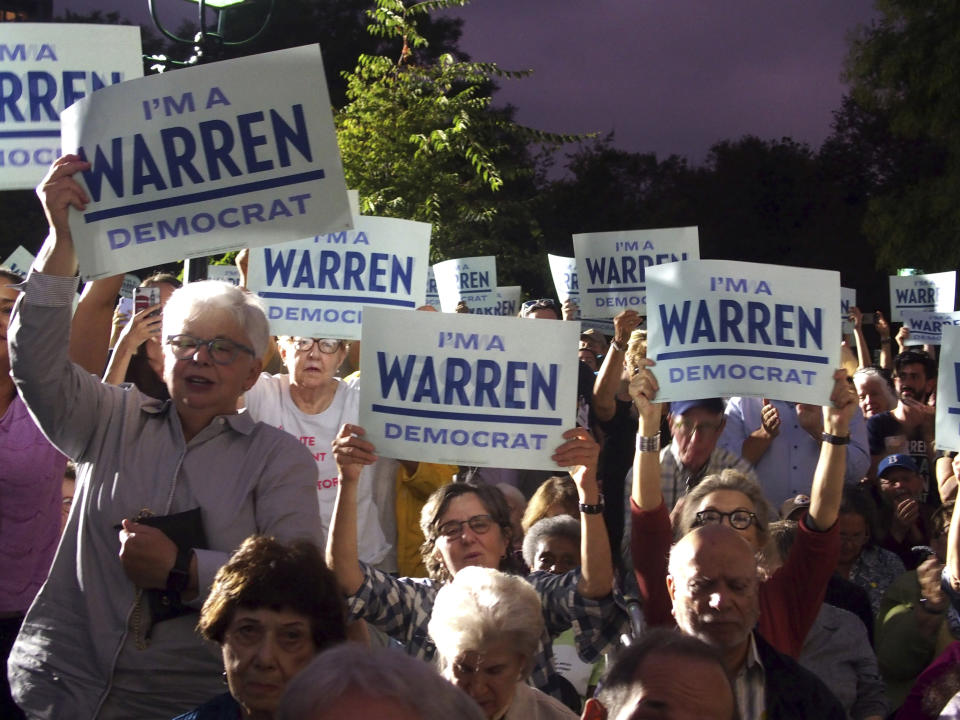The Bernie Sanders billionaire-eradication plan
Bernie has roared.
With fellow Democrat Elizabeth Warren gobbling up market share among liberal Democrats, Bernie Sanders has one-upped Warren with a proposed tax on “extreme wealth.” Warren was the first to propose a wealth tax on the superrich, but Sanders has gone further, more than doubling Warren’s proposed tax rate on billionaires.
Warren would impose an annual 2% tax on all personal wealth above $50 million, so a family worth $100 million would owe 2% of $50 million, or $1 million. The tax would rise to 3% for assets above $1 billion. Warren says her wealth tax would raise $275 billion per year, which she’d use to pay off student debt for millions, cover college costs for the majority of students and finance universal child care.
The Sanders plan has a lower threshold for wealth, and higher tax rates. His plan has 8 different tax levels, starting with a 1% tax on wealth above $32 million. The rate would rise to 2% on wealth from $50 million to $250 million, with a top rate of 8% on wealth over $10 billion. Sanders says his plan would raise $435 billon per year, which he’d use to fund a single-payer health plan, more affordable housing and universal child care.
How high is too high?
A wealth tax is a plausible way to raise large amounts of money from people most able to afford it. But economists who have studied the concept say there’s an “optimal” level of taxation that preserves the stock of wealth subject to taxation, so that the tax generates a stable stream of revenue over time. If it’s above the optimal level, the wealth tax would be “confiscatory” and erode the wealth of the superrich, leaving less wealth to tax. If set too high, a wealth tax would trigger its own demise, since wealth would eventually fall below the thresholds for taxation.

The Sanders tax rates may be confiscatory, which means they could reduce the overall stock of wealth among the superrich, knocking some of them from the billionaire’s club to the millionaire’s club. An 8% tax on assets worth more than $10 billion, for instance, means those assets would have to generate annual investment returns of 8% just to keep the family’s net worth steady. That’s a tough target, especially in a time of low interest rates. On assets from $1 billion to $2.5 billion, the Sanders tax rate would be 4%. It’s easier to hit an annual average return of 4%, but even that’s not a given in a bear stock market or recession.
Sanders harbors no love for the 1%, and he’d shed no tears for those who’d lose billionaire status under his plan. But the lower rates under Elizabeth Warren’s plan might generate more sustainable revenue, and be more politically palatable, besides.
Thinning the herd of billionaires
In recent research on wealth taxation, economists Emmanuel Saez and Gabriel Zucman of the University of California at Berkeley modeled the effect of two different wealth taxes on America’s 15 richest billionaires, using net worth data published by Forbes. At the top of the list, Jeff Bezos’s net worth of $160 billion would have fallen to $87 billion if a 3% tax on wealth above $1 billion had been in place since 1982. But if the tax had been 10% – closer to the Sanders levels—his wealth would have fallen to $24 billion. The lower tax rate cut Bezos’s wealth by 46%, while the higher tax rate cut it by 85%.
Most members of the Forbes 400 are worth less than $10 billion, and two-thirds are worth less than $5 billion. Warren’s 3% tax on wealth above $1 billion would undoubtedly thin the herd of billionaires. The Sanders wealth tax could endanger the herd.

Would it matter if America had fewer billionaires? It could. Rich people’s wealth is invested in something, and any tax that limits investment will impede economic growth in ways that eventually hurt ordinary workers. Yet revenue from a wealth tax could be invested (spent) in ways that generate a net positive return to the economy. Smart infrastructure spending benefits the overall U.S. economy, for instance. So does improved education that gives workers better skills and makes them more productive.
Sanders might be content to simply take from the rich and let them moan. That would, in fact, reduce wealth inequality, which has been a worsening problem. But taking from the rich wouldn’t necessarily make the rest better off. It would only help if the money were used productively and at least some politically connected billionaires went along with it. Spend their money wisely, and they might not get too upset. Plunder and waste, by contrast, would be a blown opportunity.
Rick Newman is the author of four books, including “Rebounders: How Winners Pivot from Setback to Success.” Follow him on Twitter: @rickjnewman. Confidential tip line: [email protected]. Encrypted communication available. Click here to get Rick’s stories by email.
Read more:
The rich should get ready for Warren’s wealth tax
Democrats are attacking the wrong companies
Trump’s biggest gamble yet: tax hikes before an election
Obama was better for your 401(k) than Trump has been
Read the latest financial and business news from Yahoo Finance
Follow Yahoo Finance on Twitter, Facebook, Instagram, Flipboard, SmartNews, LinkedIn, YouTube, and reddit.


